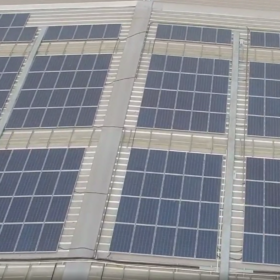India needs to boost the tender activity for variable renewable energy (VRE) as it must add more than 30-35 GW of new VRE capacity annually to meet the ‘450 GW by 2030’ target of installed capacity, says a new report by IEEFA and JMK Research.
The report states that the nation tendered a cumulative 161 GW of solar, wind, and hybrid capacity from 2010 to 2022 and allocated 114 GW. Over the last few years, tendering (both issuance and allotment) of utility-scale projects (mainly solar and wind) has shown a downward trend and is not in tandem with government targets. The variable renewable energy (VRE) capacity tendered annually in India fell from 40 GW in 2019 to about 28 GW in 2022.
The report highlights factors causing low tender volumes in recent years. It states there is a noticeable shift in the off-taker’s power demand profile. Distribution companies (DISCOMs) no longer prefer plain vanilla solar and wind projects. Instead, because of VRE’s inherent intermittency and seasonality, they seek alternate clean energy solutions that offer more stable and firm power, such as wind-solar hybrid and renewable energy coupled with energy storage.
The Solar Energy Corp. of India (SECI)— the key central government entity responsible for issuing new tenders and concluding auctions—is transitioning to new-age tenders of round-the-clock (RTC) power supply, renewable energy coupled with storage, and others to suit the need of DISCOMs.
“This has been a gradual process, and it has been a challenge to discover the optimum mix of technologies and tender conditions to arrive at suitable tariffs for both DISCOMs and developers. Currently, for firm renewable energy power, pumped hydro storage technology is the only viable option with tariffs of INR 5-6/kWh ($0.06-0.07/kWh),” the report states.
Some renewable energy-rich states like Karnataka and Andhra Pradesh have already achieved their renewable purchase obligation (RPO) targets. Hence, tender issuance from these states has slowed significantly in the past couple of years, despite the still-free interstate grid transmission access for VRE.
The report adds a lack of participation from developers in some recent tenders led to under-subscription. Aggressive bidding and the failure of bidders to foresee a 30-40% rise in solar module prices have slowed developer participation. Rising project costs due to the Approved List of Module Manufacturers (ALMM) mandate and Basic Custom Duty (BCD) on solar cell and module imports have also diminished the risk appetite of developers to bid aggressively on projects. The poor financial health of state DISCOMs leading to payment delays and the renegotiation of already executed contracts by certain states are other factors negatively affecting developer participation.
Given that the tariffs discovered in auctions of new-age tenders are on the higher side, DISCOMs continue to rely on conventional thermal power.
The report recommends future renewable energy tenders should consider the harmony of requirements between the energy generators (developers) and the off-takers (DISCOMs). The upcoming renewable energy tenders must have a balanced approach between driving down tariffs and maintaining healthy competition by reducing the financial stress as a result of excessively aggressive bidding, stated the report
The government is also planning to remove the reverse auctions in wind tenders to address the same issue. The bidding process will only consist of closed bidding to discover the lowest quoted (L1) tariff among all the bidders in an auction. There will be no subsequent round of bidding to further drive down the prices.
The report also recommends strict enforcement of renewable purchase obligations (RPOs) across all states with heavy penalties for failures to meet them. Further, payment security mechanisms should be strengthened to address developers’ fears of delayed payments, especially in state tenders.
This content is protected by copyright and may not be reused. If you want to cooperate with us and would like to reuse some of our content, please contact: editors@pv-magazine.com.









By submitting this form you agree to pv magazine using your data for the purposes of publishing your comment.
Your personal data will only be disclosed or otherwise transmitted to third parties for the purposes of spam filtering or if this is necessary for technical maintenance of the website. Any other transfer to third parties will not take place unless this is justified on the basis of applicable data protection regulations or if pv magazine is legally obliged to do so.
You may revoke this consent at any time with effect for the future, in which case your personal data will be deleted immediately. Otherwise, your data will be deleted if pv magazine has processed your request or the purpose of data storage is fulfilled.
Further information on data privacy can be found in our Data Protection Policy.